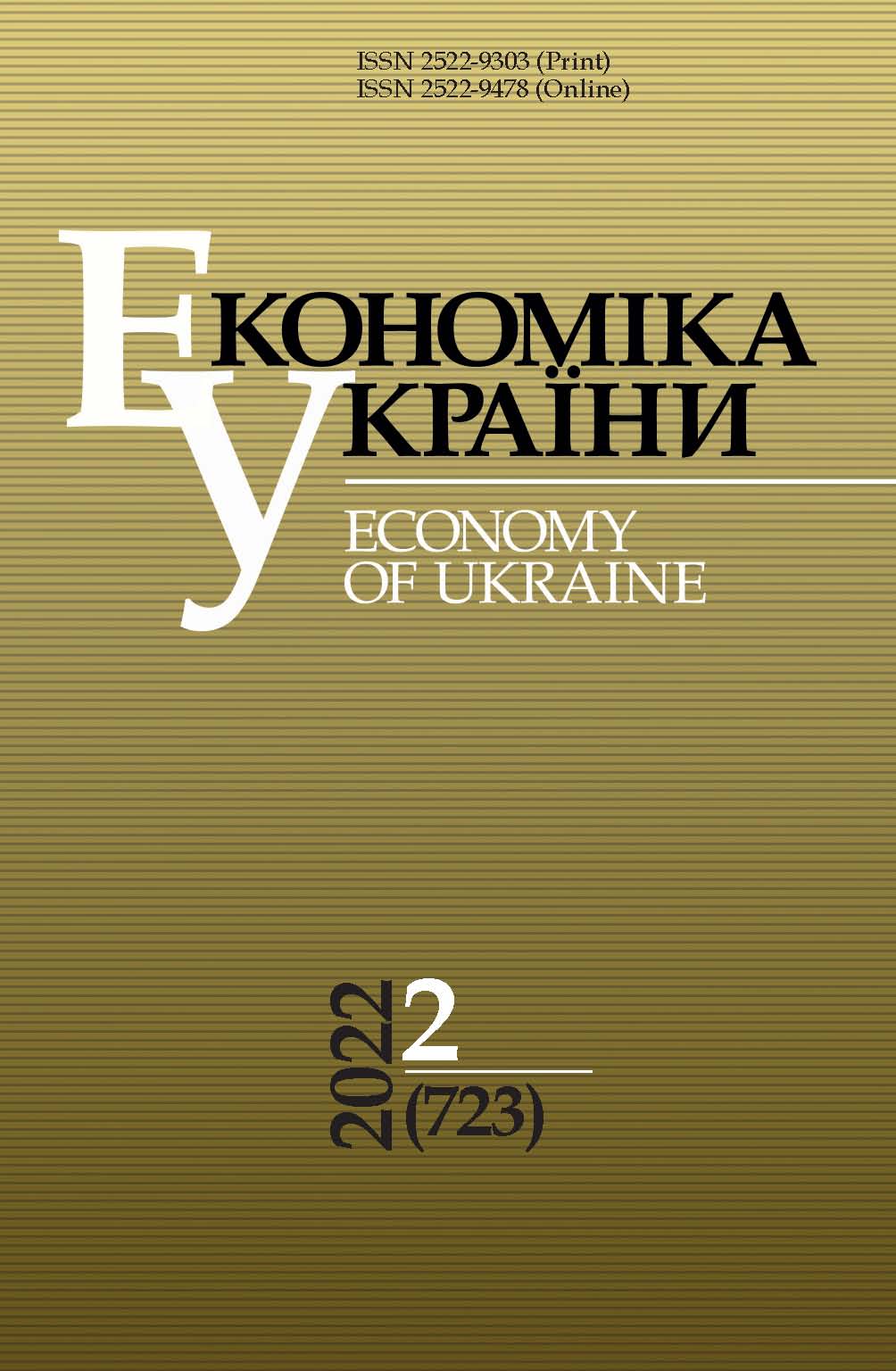REGULATION OF COMPETITION IN THE ECONOMY OF PLATFORMS: PROBLEMS AND TOOLS
DOI:
https://doi.org/10.15407/economyukr.2022.02.003Keywords:
competition policy; economic regulation; digital economy; digital platforms.Abstract
An important consequence of the digitalization of the economy is the radical restructuring of the institutional landscape of human economic activity. Its key element is the rapid spread of the platform business model, which is achieved through competitive advantages over traditional hierarchical structures. In the new conditions, the transformation of their sources and tools of competition actualizes the task of reviewing the principles of state competition policy.
The specifics of information (digital) platforms as an object of regulatory influence are determined, the principles of regulation in the digital economy are outlined, the role of IPs as regulatory intermediaries is indicated, the peculiarities of the state competition policy in the IP economy are highlighted. The directions of market positioning, sources of competitive advantages of digital platforms and their influence on the transformation of regulatory policy are considered. Emphasis is placed on the peculiarities of combining strict rules and general principles, diffuse monitoring and algorithmic control, the need to take into account the differences between B2B, B2C and P2P in the process of regulating the activities of platforms. The tools of their regulation are presented. The regulatory functions of digital platforms are defined and the key role of reputational tools as a means of regulation is substantiated. The preconditions and mechanisms of using digital platforms as regulatory intermediaries are analyzed. Examples of regulatory mediation are given.
The areas of competition policy include support for the development of digital platforms, protection of competition and restriction of monopolization of markets formed by platforms, protection of competition in platform ecosystems. The focus is on the role of data as a specific factor of production and a resource for gaining competitive advantage in platform markets. The tools of prohibitions and obligations that can be used to restrict anti-competitive behavior are presented. The preconditions for the emergence and means of anticompetitive actions of structural (dominant) platforms are analyzed. Mergers and acquisitions are studied as an object of regulation of anticompetitive actions in the platform economy. The influence of platforming on the prospects of national competition policy development is considered.
References
Rochet J.-C., Tirole J. Platform Competition in Two-Sided Markets. Journal of the European Economic Association, 2003, Vol. 1, No. 4, pp. 990-1029.
doi.org/10.1162/154247603322493212
Evans D. The Antitrust Economics of Multi-Sided Platform Markets. Yale Journal of Regulation, 2003, No. 20, pp. 325-381.
Evans D., Schmalensee R. Antitrust Analysis of Platform Markets: Why the Supreme Court Got it Right in American Express. New York, Competition Policy International, 2019.
The Evolution of Antitrust in the Digital Era: Essays on Competition Policy. Evans D., Fels A., Tucker C. (Eds.). New York, Competition Policy International, 2020.
Stucke M. Virtual Competition: The Promise and Perils of the Algorithm-Driven Economy. Cambridge, Harvard University Press, 2016.
Lypov V. The influence of platformization on the transformation of socio-economic relations: A competitive component. Economic Herald of the Donbass, 2021, No. 3 (65), pp. 222-233 [in Ukrainian].
doi.org/10.12958/1817-3772-2021-3(65)-222-233
Casadesus-Masanell R., Ruiz-Aliseda F. Platform Competition, Compatibility, and Social Efficiency. NET Institute. Working Paper, 2009, No. 08.32.
doi.org/10.2139/ssrn.1440150
Duch-Brown N. The Competitive Landscape of Online Platforms. JRC Digital Economy Working Paper, 2017, No. 04.
Hrytsenko A., Lypov V. Information platforms as a network institutional transformation. Journal of Institutional Studies, 2020, No. 12 (2), pp. 132-148 [in Russian].
doi.org/10.17835/2076-6297.2020.12.2.132-148
Smorto G. Regulating (and Self-regulating) the Sharing Economy, in Europe: An Overview. Multidisciplinary Design of Sharing Services. M. Bruglieri (Ed.). New York, Springer International Publishing AG, 2018, pp. 111-128.
doi.org/10.1007/978-3-319-78099-3_8
Busch Ch. Self-Regulation and Regulatory Intermediation in the Platform Economy. The Role of the EU in Transnational Legal Ordering: Standards, Contracts and Codes. Gamito M.C., Micklitz H.-W. (Eds.). Northampton, Massachusetts, Edward Elgar, 2019, pp. 115-134.
doi.org/10.4337/9781788118415.00013
Dunne N. Platforms as Regulators. July 31, 2020, available at: ssrn.com/abstract=3665007
doi.org/10.2139/ssrn.3665007
Andriychuk O., Andriychuk V. Digital markets act: A new philosophy of competition regulation in the EU. Economy of Ukraine, 2021, No. 8, pp. 26-37. doi.org/10.15407/economyukr.2021.08.026 [in Ukrainian].
doi.org/10.15407/economyukr.2021.08.026
Miller S. First Principles for Regulating the Sharing Economy. Harvard Journal on Legislation, 2016, No. 147, pp. 147-202.
Crémer J., Montjoye E.-A., Schweitzer H. Competition Policy for the Digital Era. Luxembourg, Publications Office of the European Union, 2019, available at: https:// op.europa.eu/en/publication-detail/-/publication/21dc175c-7b76-11e9-9f05-01aa75ed71a1/language-en (accessed on: 09.12.2021).
Parker, G., Petropoulos G., van Alstyne M. Digital platforms and antitrust. Bruegel Working Paper, 2020, No. 6.
doi.org/10.2139/ssrn.3608397
Bourreau M. Perrot A. Digital Platforms: Regulate Before it's Too Late. Notes du conseil d'analyse économique, 2020, Vol. 60, No. 6, pp. 1-12.
doi.org/10.3917/ncae.060.0001
Ciriani S., Lebourges M. The Role of Market Power in Economic Growth: an Analysis of the Differences Between EU and US Competition Policy Theory, Practice and Outcomes. European Journal of Government and Economics, 2016, Vol. 5, No. 1, pp. 5-28.
doi.org/10.17979/ejge.2016.5.1.4313
van Gorp N., Batura O. Challenges for Competition Policy in the Digitalised Economy. Study for the ECON Committee, European Parliament. Brussels, Directorate General for Internal Policies, 2015.
Nochebuena C., Juárez B. Competition Policy for Regulating Online Platforms in the APEC Region. Mexico, FTI, 2019.
Lypov V. Socio-economic basis of differences between US and EU competition policy: Information (digital) platforms. Ukrainian Yearbook of European Integration Studies, 2020, Iss. V, pp. 87-100 [in Ukrainian].
Abbot K., Levi-Faur D., Snidal D. Theorizing Regulatory Intermediaries. Annals of the American Academy of Social and Political Sciences, 2017, No. 670 (1), pp. 14-35.
doi.org/10.1177/0002716216688272
Coglianese C., Mendelson E. Meta Regulation and Self-Regulation. Research Paper Penn Law School Public Law and Legal Theory, 2012, No. 12-11, available at: papers.ssrn.com/sol3/papers.cfm?abstract_id=2002755 (accessed on: 09.12.2021).
Lypov V. Information platforms and digitalization of tourism in the conditions of a crisis: potential, problems, paradoxes. Tourism and the Global Crises, Veliko Tarnovo, I&B Publishing House, 2021, pp. 588-597 [in Russian].
Downloads
Published
How to Cite
Issue
Section
License
Copyright (c) 2022 Institute for Economics and Forecasting of the NAS of Ukraine

This work is licensed under a Creative Commons Attribution-NonCommercial-NoDerivatives 4.0 International License.



